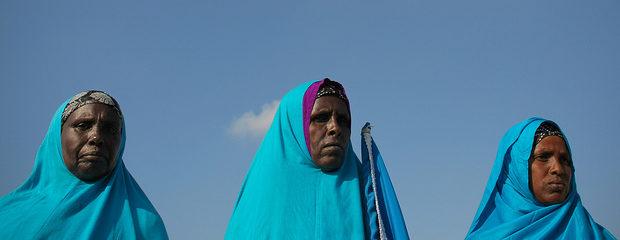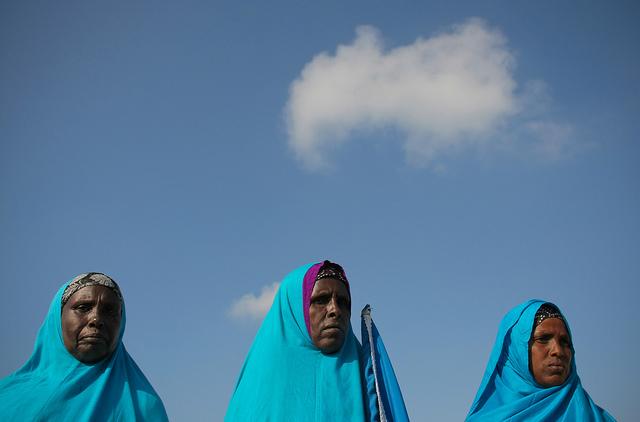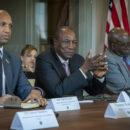4 questions the new president must confront in deciding what kind of democracy Somalia should be

Somalia has elected new president Abdullahi Mohamed Farmajo in an indirect selection process. Work towards one-person-one-vote elections must begin right away.

How can the new government ensure every citizen gets to vote in the next elections? Credit: UN Photo/Stuart Price.
Yesterday, following a drawn out process of indirect elections, Abdullahi Mohamed Farmajo was chosen by parliamentarians to be President of the Federal Government of Somalia. The election of the former prime minister came after the incumbent and runner-up Hassan Sheikh Mohamud conceded defeat following two rounds of voting.
The presidential vote followed the recent election of a new Federal Parliament – which for the first time is formed from all federal member states – as well as the establishment of an Upper House.
The challenges facing Farmajo’s new government will be wide-ranging, including reforming security and justice institutions and providing basic education and health services. However, especially given the prevalent allegations of corruption and fraud in the just-completed indirect elections, another significant task facing the new president will be to pave the way for free and fair direct elections in 2020-21.
Even though more Somalis voted in 2016-17 than at any point in the past 50 years, the electoral college was still limited to just 14,025 people, excluding the vast majority of the country. The new government in 2012 had promised that these elections would be one-person-one-vote, but this ambition was pushed back to 2020-21. There is already considerable pressure – from Somalis, international organisations and donor governments – for this new government to deliver.
Elections are important for Somalia’s state-building process, but they can also be divisive and destabilising. Many challenging technical and political questions will need to be worked out. Although Somalia’s 2016-17 process has only just concluded, work towards 2020-21 must start soon, beginning by considering four broad questions.
[The Big Cheese: Why President Farmaajo holds so much hope for Somalia]
1) Which model will future elections use?
The 275 parliamentary seats in Somalia’s 2016-17 indirect elections were allocated using a controversial ‘4.5’ power-sharing model. Since 2000, this 4.5 formula has shared seats among the four major clans and numerous minority clans. Although unpopular among the minority clans who are only allocated a ‘0.5’ share of representation, the model has arguably been successful in achieving a level of stability in Somalia otherwise absent for many decades.
But there is still little clarity on what model elections in 2020-21 will use. If one-person-one-vote elections no longer pre-allocate seats on a clan basis, then the largest clan is likely to achieve the greatest representation in parliament. Such a scenario would upset the balance that has underpinned recent promising, albeit uneven, state-building efforts.
Donor governments and the United Nations should present the Federal Parliament with different electoral models that show how different options are likely to affect seat allocations. Somalis can then consider critically how this may impact peace and security dynamics.
2) What about elections for the federal member states?
Since 2012, Somalia has undertaken a rapid federalisation process. Somalia now consists of five federal member states: Puntland, Jubaland, South West, Galmudug, and HirShabelle. The status of the capital Mogadishu is yet to be defined.
Research carried out in Jubaland by peace-building NGO Saferworld has found significant public support for federalism and state-level elections. But if federal member states do not manage transfers of power peacefully, there is a risk that states will degenerate into unaccountable clan fiefdoms. And if states are unable to ensure security and access to services for their citizens, public support for federalism might dissipate.
Currently there is no agreed framework or timeline for staging federal and state elections, nor any agreement on how they might merge. Given Somalia’s history of failed top-down state-building processes, donors should rebalance their current support and develop an approach that includes both federal and state elections.
3) Can technical and political preparations be completed in time?
There are many hurdles to holding one-person-one-vote elections by 2020-21. To begin with, efforts to amend and ratify Somalia’s provisional constitution, which is supposed to determine the broader electoral model, stalled in mid-2016. Substantial investments by Somalia’s government and donors will be required to ensure a final constitution has broad political consensus and is a product of meaningful citizen consultations.
Somalia has no recent census or civic register meaning that voter registration will be difficult for federal and state-level elections. Introducing highly sophisticated registration systems across all six states – such as the iris recognition method used in 2016 in the self-declared independent Republic of Somaliland – would exceed budgets. To be cost-effective, the federal government, federal member states and the international community need to agree upon a single system for voter registration – one that serves both federal and state elections.
4) Can Somalia hold peaceful elections amid continued conflict with al-Shabaab?
Security incidents did not severely affect the 2016-17 elections. But major changes to the security environment in Somalia are likely over the next few years, notably the drawdown of the African Union forces.
If a decreased international military presence is not accompanied by successful reforms to build an effective Somalia National Army, police service, and state-level formal security, this could leave a vacuum that the Islamist group al-Shabaab could exploit.
Surveys conducted by Saferworld suggest that the public’s greatest reason for not wishing to take part in one-person-one-vote elections would be fear of insecurity. Though military efforts have weakened al-Shabaab, a longer-term solution to the conflict is necessary to avoid their continued disruption of security and state-building in Somalia.
Oliver Chevreau manages the Danish International Development Agency-funded ‘participatory governance and peacebuilding programme’ in Somalia. Oliver has been with Saferworld for four years, having previously been Country Manager for the Saferworld Somalia/Land Programme.
Ali Aden Abdi is Programme Adviser for Somalia/Somaliland for Saferworld. He was previously Somalia Programme Coordinator and Programme Adviser at the Life and Peace Institute .






